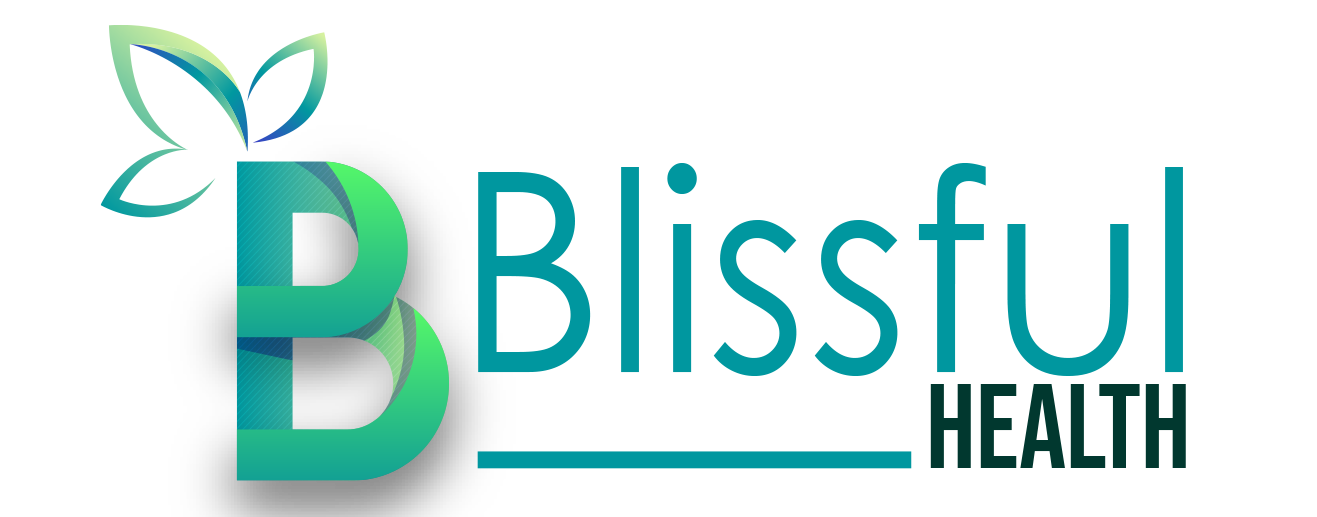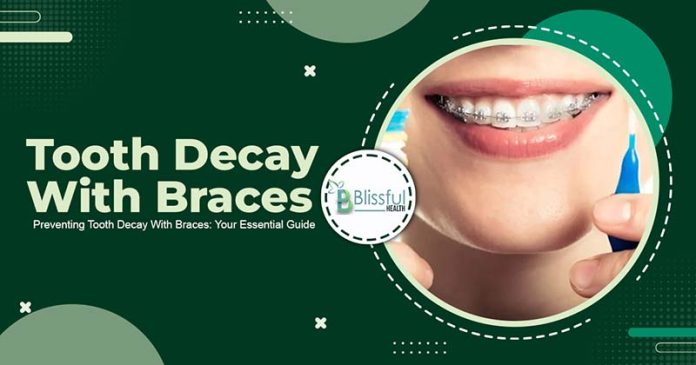Maintaining proper oral hygiene during orthodontic treatment is essential for both the aesthetics of your smile and your overall health. Braces often trap food particles and create barriers that make it more difficult to clean teeth effectively.
As plaque builds up, it can stain teeth and erode tooth enamel. In this article, Blissfulhealth will provide essential tips for maintaining oral health throughout your orthodontic journey.
Recognizing Signs of Tooth Decay with Braces
Wearing braces can straighten your teeth and enhance your oral health, but it can also pose challenges. With braces, maintaining good oral hygiene becomes more difficult, thus increasing the risk of tooth decay. In this blog post, we’ll explore 6 signs of tooth decay with braces that you should be aware of:
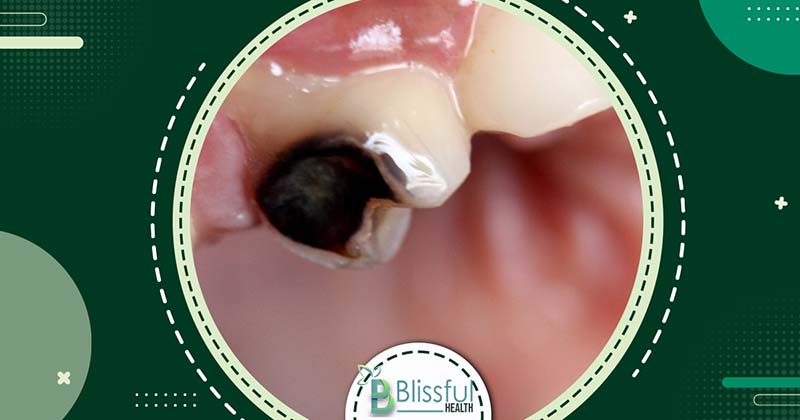
Sensitivity to Sweet
When sweets or drinks cause discomfort, it could signal a problem with one of your teeth. This sensitivity might be an early sign of decay, requiring attention from your dentist. They can check for cavities and provide necessary treatment.

Toothache
Persistent dull or throbbing toothaches should prompt a visit to your dentist. Early detection of tooth decay allows for easier treatment and prevents further damage to your teeth.

Bleeding or Swelling of Gum
If your gums start bleeding and swelling, it’s essential to see your dentist promptly. These symptoms could indicate early tooth decay, which, if left untreated, may lead to permanent damage to your gums and teeth.
Extreme Sensitivity
Sensitivity to temperature extremes, like feeling a shock when consuming hot or cold foods, could indicate cavities. Pay attention to how your teeth react to different stimuli and seek dental care if you notice extreme sensitivity.
Pits on Teeth
Tooth decay typically appears as small pits or holes in the teeth. While these signs might not be easily noticeable at first, they should prompt you to seek dental care. Early intervention can prevent further damage to your teeth.
Pus Around Gums
Pus around the gums indicates an abscess, which can result from untreated cavities or previous dental work. Professional oral health care is necessary to address this issue and prevent complications. Ignoring it could lead to severe problems in the future.
Addressing Tooth Decay After Braces Removal
To ensure your teeth remain healthy while wearing braces, we recommend the following practices:
- Use an Automatic Toothbrush: Research suggests that automatic toothbrushes are more effective in removing plaque compared to manual ones. During orthodontic treatment, an automatic toothbrush can help you clean your teeth more thoroughly, reducing the risk of cavities.

- Focus on Fully Cleaning Each Bracket when Brushing: Plaque tends to accumulate around braces brackets. To prevent plaque buildup, make sure to brush thoroughly around every bracket, including above, below, and in between. Consider using an oscillating brush head designed specifically for cleaning brackets to make this task easier.
- Experiment with Dental Floss Alternatives: Flossing becomes more challenging with braces, but there are alternative products available to help. Thread floss and water flossers are popular options among orthodontic patients as they make flossing easier and more effective.
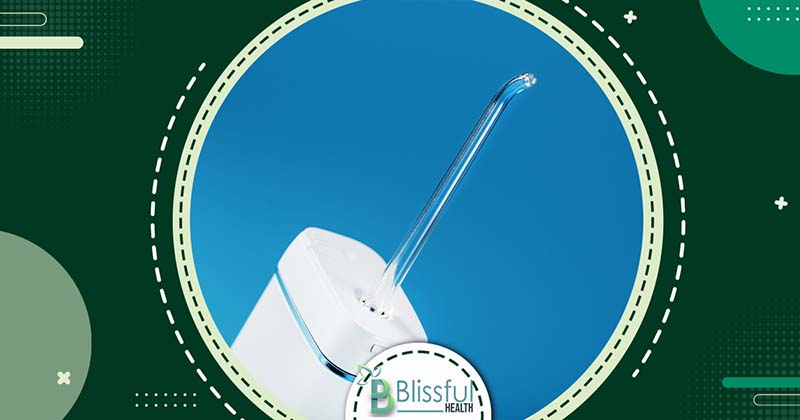
- Use Fluoridated Mouthwash Daily: Fluoride plays a crucial role in maintaining strong, cavity-resistant teeth. Incorporating a fluoridated mouthwash into your daily oral care routine can help strengthen your teeth and protect them against cavities.
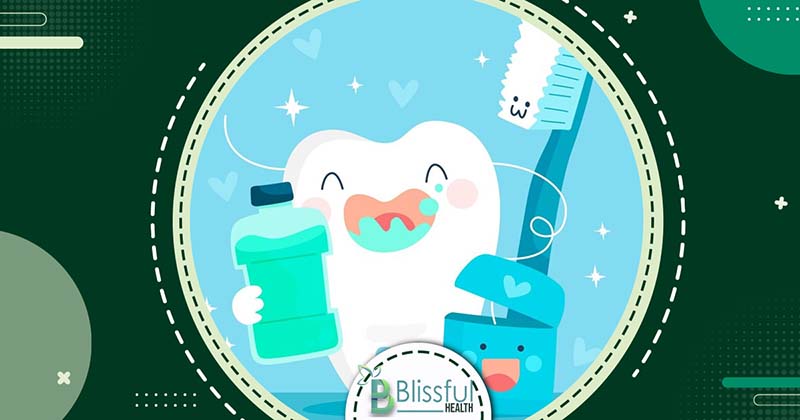
Effective Strategies to Prevent Tooth Decay with Braces
Braces can trap food particles, leading to the accumulation of bacteria and plaque on your teeth and gums, which can cause tooth decay. Here are some excellent dental hygiene practices to help prevent tooth decay:
Choose a Soft Toothbrush: Use a soft-bristled toothbrush to effectively clean around the brackets and gums. Angle the brush towards the gums to ensure thorough cleaning of the enamel. Soft bristles are gentler on the gums and help prevent irritation.
Brush After Every Meal: Since brace wires can trap food debris, it’s essential to brush after every meal to prevent plaque buildup. Consider carrying a travel toothbrush for convenience. If brushing isn’t possible, rinse your mouth with water for 30 seconds. However, avoid brushing immediately after consuming acidic foods, as it can soften tooth enamel. Wait 30 minutes to an hour before brushing after consuming acidic foods like oranges or sports drinks.
Use Minimal Toothpaste: Excessive foam from toothpaste can make it challenging to see plaque and debris. Start by brushing with a wet toothbrush to clean around the brackets and wires. Use a precise picking motion instead of scrubbing. Afterward, add a pea-sized amount of toothpaste and continue cleaning.
Brush for Two Minutes: Brush your teeth for a full two minutes, spending 30 seconds on each quadrant of your mouth (upper right, lower right, upper left, and lower left). Clean both the outer and inner sides of your teeth. Use a timer to ensure you brush for the recommended duration.
Use a Floss Threader or Waterpik: Flossing with braces can be challenging. Use a floss threader to guide floss through the wires and eliminate plaque with a saw-like motion. Alternatively, consider investing in a water flosser, which cleanses with a stream of water and provides quick and easy flossing.
Clean with Mouthwash at Night: Use an anti-cavity, fluoride mouthwash to reduce tooth decay and protect enamel. Rinse for one minute to eliminate any remaining debris. After rinsing, check in the mirror for any missed spots.
These practices can help maintain good oral hygiene and prevent tooth decay while wearing braces.
FAQs
Do Braces Increase the Risk of Tooth Decay?
While braces themselves don’t directly cause cavities, they can increase the risk of plaque accumulation and tooth decay. People with braces are more prone to cavities due to the challenges in cleaning around the braces. Depending on the type of braces worn, they can trap food particles and sugars from certain beverages, increasing the likelihood of decay.
Can Braces Help Treat Tooth Decay?
Although braces are not a treatment for existing cavities, they are effective in preventing future decay by correcting misalignments that complicate proper cleaning. By securing brackets to each tooth and adjusting them with wires and elastic bands, braces can enhance oral hygiene and diminish the risk of developing cavities.
Tips for Maintaining Clean Braces
- Choose the Right Toothbrush: Consider using an electric toothbrush or brushes specifically designed for cleaning around braces. Spindle brushes are effective in removing food particles from between teeth and braces.
- Use Mouthwash: After brushing and flossing, use mouthwash containing fluoride to support oral health and eliminate bacteria.
- Watch Your Diet: Sticky foods should be avoided as they can adhere to the braces and are difficult to clean off. Foods like popcorn, chips, caramel, and corn on the cob are examples to steer clear of.
- Gargle with Salt Water: Gargling with salt water, especially after getting braces or after adjustments when teeth and jaws are sore, can help maintain oral health and cleanliness.
Understanding the Consequences of Tooth Decay with Braces
Tooth decay can cause sharp pain, which, coupled with the discomfort from braces, can affect overall oral health. This reduced pain tolerance can make wearing braces more challenging. It’s advisable to address tooth decay before getting braces to minimize discomfort and maintain oral health.
Conclusion
In summary, maintaining oral health while wearing braces is crucial in preventing tooth decay and ensuring a beautiful smile. We’ve covered essential tips and strategies to help you keep your teeth clean and healthy during orthodontic treatment. Now, we’d love to hear from you! Share your own stories and experiences tooth decay with braces with braces and oral hygiene. Don’t forget to explore more blogs on dental care and orthodontics on BlissfulHealth website. Let’s strive for healthier smiles together!

